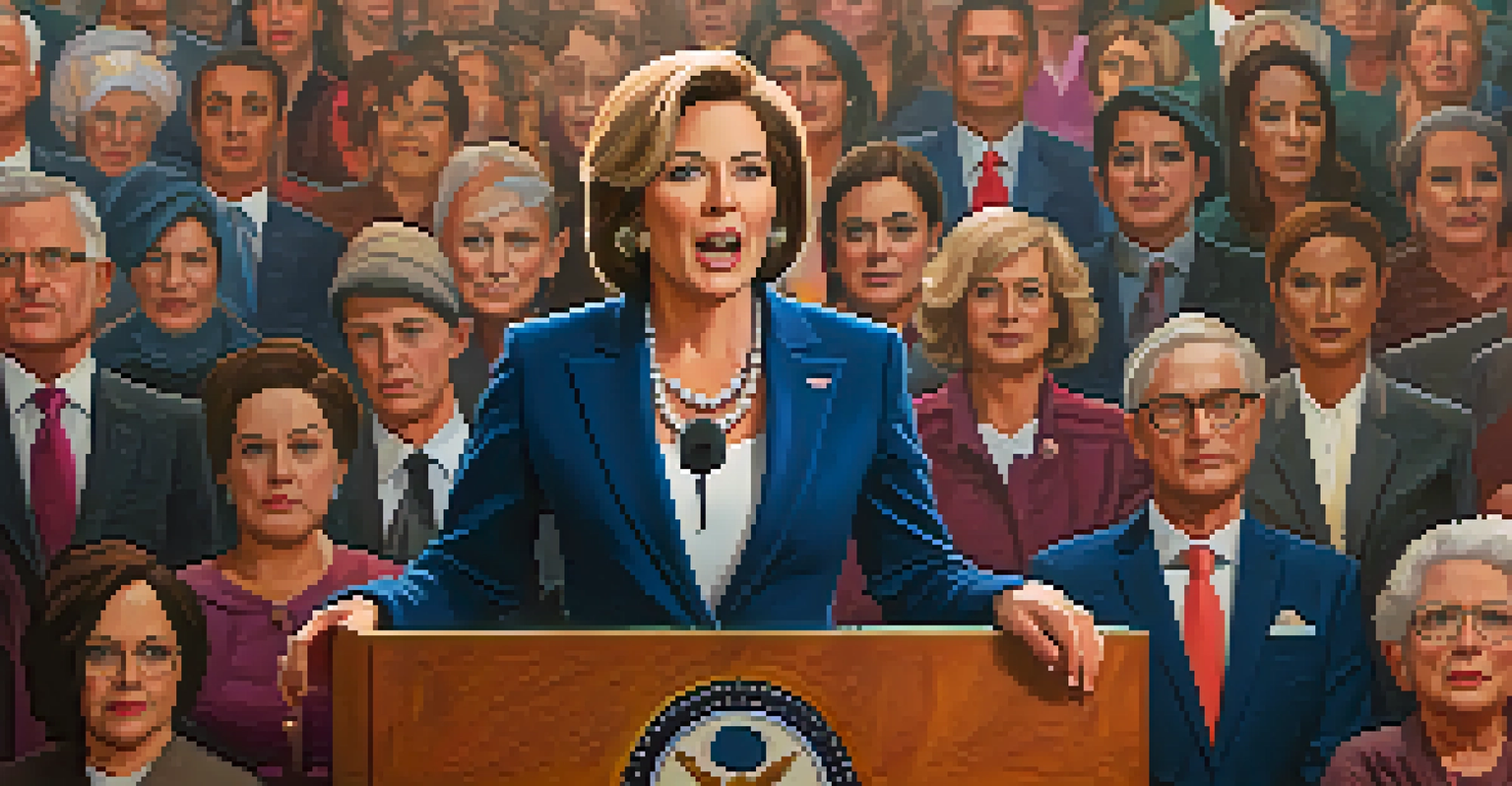Women in Louisiana Politics: Progress and Challenges

Historical Context of Women in Louisiana Politics
Women have played a crucial role in Louisiana's political landscape, though their presence has often been overshadowed by male counterparts. Historically, women faced significant barriers to entry, including legal restrictions and societal norms that discouraged female leadership. However, notable figures such as Governor Kathleen Blanco paved the way for future generations, illustrating that women could hold high office and effect change in their communities.
The only way to make a difference in a community is to be actively involved in it and to be a voice for the voiceless.
As we look back, the suffrage movement in the early 20th century marked a turning point, allowing women to vote and engage politically. This newfound empowerment led to increased participation in local and state politics, though progress remained slow for many years. The 1970s saw the establishment of organizations aimed at supporting women in politics, creating networks that would foster female candidates and their ambitions.
Today, Louisiana's political history is increasingly being redefined by the contributions of women. While there are still challenges to overcome, the legacy of trailblazing women continues to inspire new leaders. Understanding this historical context is vital in recognizing the progress achieved and the challenges that remain.
Current Representation of Women in Louisiana Government
As of now, women hold a modest yet impactful presence in Louisiana's government. While they have made strides in various elected offices, the overall representation still lags behind national averages. For instance, Louisiana currently ranks among the states with the lowest percentage of women in the legislature, which signifies a pressing need for increased female representation.

Despite these figures, women in Louisiana politics have been making their mark in significant roles, such as state legislators, mayors, and even in the U.S. Congress. Their contributions range from advocating for education reforms to addressing health disparities, showcasing the diverse interests and expertise women bring to the table. This representation is crucial, as it allows for a wider range of perspectives in decision-making processes.
Historical Challenges for Women
Women in Louisiana politics have historically faced significant barriers, but trailblazers like Governor Kathleen Blanco have paved the way for future generations.
Moreover, various initiatives and organizations are actively working to empower women to pursue political office. Programs that provide mentorship, training, and resources aim to bridge the gap and motivate more women to enter politics. By fostering a supportive environment, Louisiana can continue to see growth in female political representation.
Barriers to Women's Political Participation
Despite the progress, women in Louisiana politics still encounter numerous barriers that hinder their participation. Societal expectations and stereotypes often lead to the perception that women may not be as capable as men in leadership roles, discouraging potential candidates. Additionally, the balancing act of family responsibilities often weighs heavily on women, making it challenging to commit fully to a political career.
Women are not just leaders in their homes; they are leaders in their communities, and they deserve to be heard and represented in every sphere of society.
Financial constraints also play a significant role in limiting women's political ambitions. Running for office can be costly, and women often face difficulties in securing campaign funding compared to their male counterparts. This financial disparity can deter capable women from entering the race, perpetuating the cycle of underrepresentation.
Lastly, a lack of representation can create a daunting environment for aspiring female politicians. When women do not see others like themselves in leadership positions, it can be hard to envision a path forward. Addressing these barriers is essential to creating a more inclusive political landscape in Louisiana.
Success Stories: Women Making a Difference
In the face of challenges, many women in Louisiana have risen to the occasion, creating inspiring success stories. One such example is LaToya Cantrell, the first female mayor of New Orleans, who has been at the forefront of initiatives to address the city's pressing issues, from public safety to housing. Her leadership serves as a testament to the positive impact women can have in political positions.
Another notable figure is Dr. C. M. “Mimi” Waggoner, who has successfully advocated for education reform in the state. Her efforts to improve the educational system have not only benefited students but have also highlighted the importance of women’s voices in shaping policies that affect future generations. These success stories illustrate the tangible changes women can bring to their communities.
Current Representation Gaps
Despite strides in various elected offices, Louisiana still ranks low in female representation, highlighting the need for increased participation.
These women, along with many others, serve as role models and trailblazers for the next generation of female leaders. Their journeys demonstrate that, despite the obstacles, women can and do make significant contributions to Louisiana's political landscape. Celebrating these successes is crucial in motivating more women to step forward and pursue their political aspirations.
The Role of Advocacy Groups and Organizations
Advocacy groups play a pivotal role in supporting and empowering women in Louisiana politics. Organizations such as the Louisiana Association of Women Attorneys and the Women's Foundation of Greater New Orleans provide essential resources, networking opportunities, and training for aspiring female politicians. These groups are vital in creating a supportive community that encourages women's participation in the political arena.
Additionally, these organizations often engage in advocacy efforts aimed at promoting policies that benefit women and families. By raising awareness about issues like reproductive rights, equal pay, and healthcare access, they ensure that women's voices are heard in legislative discussions. This advocacy is vital in creating an equitable political environment.
Moreover, mentorship programs offered by these organizations can significantly enhance the confidence and skills of women looking to enter politics. By connecting seasoned politicians with newcomers, these programs foster knowledge sharing and create pathways for women to navigate the complex world of political campaigns. Such support is invaluable in breaking down barriers and building a more diverse political landscape.
The Impact of Social Media on Women in Politics
Social media has emerged as a powerful tool for women in Louisiana politics, providing a platform to amplify their voices and connect with constituents. Platforms like Twitter, Facebook, and Instagram allow female politicians to share their messages directly with the public, bypassing traditional media barriers. This immediacy helps humanize candidates and fosters a sense of connection with voters.
Moreover, social media serves as a space for women to share their experiences and challenges in politics, creating a community of support. Hashtags like #WomenInPolitics and #ShePersisted have gained traction, allowing women to share their stories and uplift one another. This online camaraderie can be instrumental in encouraging more women to pursue political careers.
Role of Advocacy and Mentorship
Advocacy groups and mentorship programs are crucial in empowering women to pursue political careers and addressing barriers in Louisiana.
However, the digital landscape also poses challenges, such as online harassment and misinformation. Female politicians often face disproportionate scrutiny and negative comments online, which can deter some from engaging in this space. Addressing these issues is crucial to ensuring that social media remains a supportive platform for women in politics.
The Future of Women in Louisiana Politics
Looking ahead, the future of women in Louisiana politics holds both promise and challenges. With increasing awareness of the importance of diversity in political representation, more initiatives are being launched to support women candidates. As these efforts gain momentum, we may see a significant shift in the political landscape, with more women stepping into leadership roles.
Furthermore, educational programs aimed at young women are beginning to take shape, encouraging them to consider politics as a viable career path. By instilling confidence and providing resources early on, these initiatives aim to cultivate the next generation of female leaders. The momentum generated by these programs could lead to a more balanced and representative political environment in the years to come.

Ultimately, the progress made by women in Louisiana politics will depend on a collective effort from both individuals and organizations. By continuing to advocate for equal representation, addressing barriers, and celebrating successes, Louisiana can foster an inclusive political climate where women thrive. The journey may be ongoing, but the potential for transformative change is within reach.